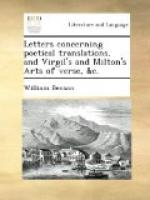Achilles’ Wrath, to Greece
the direful Spring
Of Woes un-number’d, Heav’nly
Goddess, sing.
Is not Heav’nly as much an Expletive as O, and can either of these Couplets deserve to be plac’d in the Front of the Iliad? I could wish Mr. Pope would return these two Lines once more to the Anvil, and dismiss all Expletives here at least. But enough of Expletives.
I shall now say something of Monosyllables, which seem to be absolutely condemn’d in the second Line of the two Verses just mention’d from Mr. Pope’s Essay on Criticism.
And ten low Words oft creep in one dull Line.
Mr. Dryden indeed has said in several Places, that the vast Number of Monosyllables in our Language makes it barbarous and rough, and unfit for Poetry. I am apt to think Mr. Pope gave into Mr. Dryden’s Sentiment a little too hastily. I own ten low Words too frequently creep on in one dull line, in a Poet’s Works, whom Mr. Pope has formerly celebrated with no mean Encomiums.
The following Lines afford an Example in this respect.
At the beginning of the third Book of the Davideis, this is the Description of Goliah’s Sword.
“A Sword so great, that it
was only fit
To take off his great Head, who came with it.
Cowley.
Here are ten dull Words most certainly in one dull Line.
“To take off his great Head, who came with it.
And miserable is the Metre in which they creep on. But hundreds of monosyllable Lines are to be found in Milton that are as sublime, as beautiful, and as harmonious as can possibly be written. Look only into the Morning Hymn in the fifth Book.
“Speak ye who best can tell, ye Sons of Light.
Again,
“Thou Sun! of this great World both Eye and Soul.
Again,
“And when high Noon hast gain’d, and when thou fall’st.
Again,
“With the fixt Stars, fixt in their Orb that flies.
Again,
“Breathe soft or loud; and wave your Tops, ye Pines.
Again,
“Bear on your Wings and in your Notes his Praise.
Can it be said that ten dull Words creep on dully in any one of these Lines? But Examples may likewise be given in rhym’d Verse, of the Harmony of Monosyllables. Harmony consists in mixing rough and smooth, soft and harsh Sounds. What Words can be rougher than such as these, Rides, Rapt, Throws, Storms; or smoother than these, Wheel, Hush, Lull?
“Then mounted on his radiant
Carr he rides,
And wheels along the level of the Tides.
Pit’s
1st AEneid.
How rough is the first Line, how soft the latter! As soft as the Original, which is a Masterpiece.




